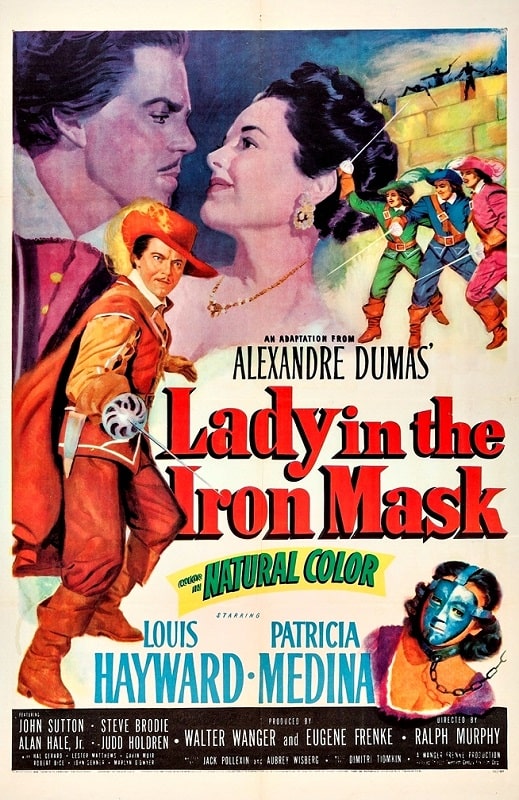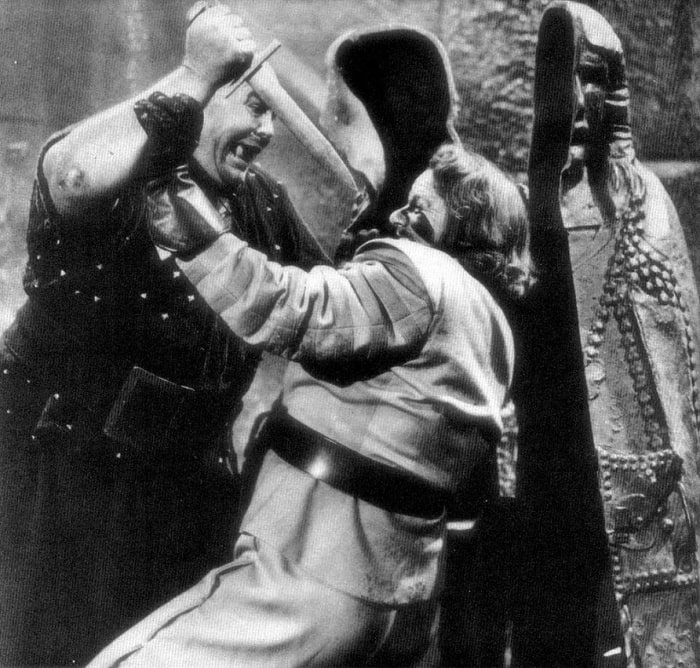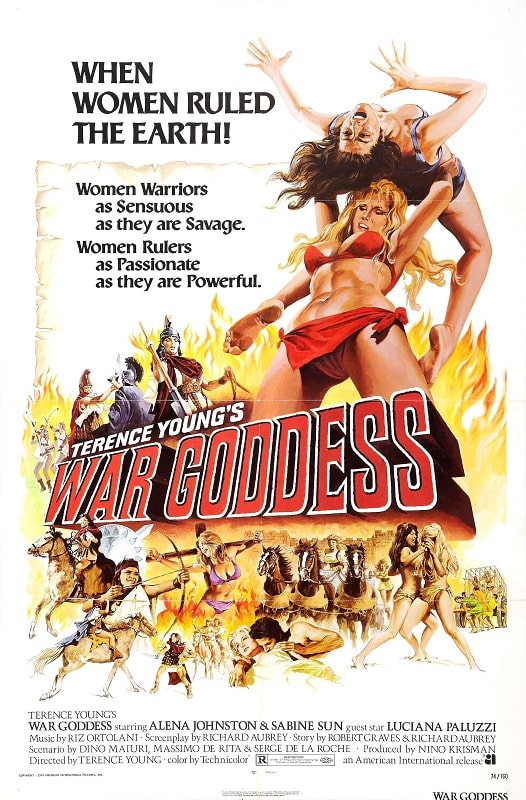Ellsworth’s Cinema of Swords: Avenging Women
Lady in the Iron Mask (USA, 1952)
Much as Your Cheerful Editor loves it when it’s the women in a movie who are plying the swords, he must admit that the swashbuckling films of the 20th Century betrayed women wielding their weapons as often as they glorified them. Filmmakers kept putting swords in ladies’ hands because it’s such an attractive image, but then usually gave those sword-swingin’ women short shrift. Most of the time this was just reflexive sexism of the “Of course women don’t fight as well as men” variety, but toward the end of the century, during the backlash against the rise of feminism, the attitude was often open scorn. There are a lot of things I miss about moviemaking from Hollywood’s golden era, but endemic misogyny isn’t one o them.
The Wife of Monte Cristo
Rating: **
Origin: USA, 1946
Director: Edward G. Ulmer
Source: YouTube streaming video
Haydee (Lenore Aubert) is practicing, sword in hand, on the fencing piste when her husband, the Count of Monte Cristo (Martin Kosleck), comes in, and the master-at-arms tells him, “Madame the Countess will soon be as expert as the best swordsman in France.” Cool! Plus, the movie poster promises, “She challenges men with her beauty… conquers them with her sword!” They have to pay off on that, right?
Wrong. Despite a promising beginning, and director Edward G. Ulmer’s stylish visual touches, The Wife of Monte Cristo is a conventional costume thriller that starts strong but then goes to pieces in its second half. Its story, “suggested by” Dumas’ novel, changes Edmond Dantès’ origin to make the wealthy count into the Avenger, a masked vigilante along the lines of Zorro or the Scarlet Pimpernel, assisted by his wife Haydee, who’s been whitewashed from Indian to European. In 1832, in a Paris caught in an outbreak of the plague, villain Danglars (Charles Dingle) and corrupt Prefect of Police de Villefort (John Loder) are making a fortune selling phony plague-cure medicine to the citizens.
Their racket is opposed by Monte Cristo as the Avenger, but when he’s slightly wounded during a raid on a medicine shipment, to protect his secret identity the count must leave town until his wound heals. In his absence, his wife Haydee dons the mask (and skintight black leathers) of the Avenger, and for a while she does great, discovering who is behind the shipments and foiling the villains’ plans to capture her husband. But then the plot requires her to get all stupid and drop her handkerchief where the police prefect will find it, she’s caught and imprisoned, and Monte Cristo has to return to Paris to save her. Bleah. The husband even gets to have the final sword duel with the prefect, which isn’t very convincing but at least it looks good. By that time the screenwriters, Ulmer and Dorcas Cochran, have gotten their heroes into a hole so deep they can’t figure out how to get them out, and the ending is an unsatisfying mess.
It’s a shame, because the leads deserve better. Kosleck has striking features, narrow with high cheekbones, and a slender frame that makes Aubert’s imposture of him credible. A refugee from Hitler’s Germany, he spent most of his time in Hollywood getting his revenge by playing despicable Nazis; this is one of his few sympathetic lead roles. Lenore Aubert, from Vienna, Austria, had also fled the swastika to America, where her European accent brought her plenty of roles during the war, though her career stagnated afterward (unless you consider Abbot and Costello Meet Frankenstein a high point). Ulmer would go on to direct The Pirates of Capri and Babes in Bagdad.
Lady in the Iron Mask
Rating: *
Origin: USA, 1952
Director: Ralph Murphy
Source: Turner Classic Movies
This is a deservedly obscure Dumas pastiche, a reimagining of The Man in the Iron Mask in which twin princesses, Anne and Louise, are born to King Louis XIII rather than twin princes, and to preserve the stability of the realm Louise is locked away in a dungeon in an iron mask to hide her resemblance to Anne. When Princess Anne (Patricia Medina) reaches adulthood, her uncle, the Duc de Valdac, plans to marry her against her will to Prince Philip of Spain and rule from behind the throne. D’Artagnan (Louis Hayward), sensing the realm is in trouble, gathers his companions Athos, Porthos, and Aramis and rides to Paris to save the day.
There’s nothing inherently wrong with this plot, but the execution of it is dreadful — this is a career low for the otherwise reliable Louis Hayward, and when I tell you that Athos (Steve Brodie) and Aramis (Judd Holdren) are outacted by the execrable Alan Hale, Jr. as Porthos, that should give you a hint as to how bad this is. The only excuse for this movie to exist is the fifteen minutes d’Artagnan and Porthos spend in the dungeon rescuing the princess.
There, the creepy iron mask does its usual visual voodoo, and worse, the musketeers find that the guardian of the dungeon is the massive Tor Johnson (Plan 9 from Outer Space)! Tor and Porthos give each other the stink-eye from the moment they meet, and you know it’s only a matter of time before they’ll be wrestling over the gaping maw of a bubbling lime pit. Spoiler: one of them goes in.
The rest of the film is a lot of routine galloping through southern California and perfunctory sword fights with foils instead of proper rapiers, though at least Hayward knows how to handle a blade, plus an absurd romance between d’Artagnan and Princess Anne that’s like weak musketeers fan-fiction. Fortunately, this film is hard to find, so you probably won’t be tempted to waste 78 minutes on it.
But that leaves us time for Musketeers Movie Trivia! Hayward, of course, played both twin princes in the 1939 version of The Man in the Iron Mask, and had a lot more fun there. And the role of Porthos was something of a Hale family heirloom: Alan Hale, Sr. played the giant musketeer in that 1939 version of Iron Mask, while his even-less-talented lookalike son took the same role in Lady in the Iron Mask, At Sword’s Point (1952), and The Fifth Musketeer (1979).
War Goddess (or The Amazons – 1973)
Rating: *
Origin: Italy/France/Spain, 1973
Director: Terence Young
Source: Retromedia DVD
This is one of the later films in the career of director Terence Young (Thunderball, Red Sun), and lo, how the mighty have fallen. Robert Graves is named as one of the sources for the story, but I, Claudius this ain’t. In the time of Greek myths, the Amazons are a warrior tribe consisting entirely of women, and the story starts with them slaughtering a band of barbaric Scythians so their warriors can complete their initiation rite of becoming an adult Amazon by killing a man. Immediate cut to their quadrennial games in which their queen is chosen by athletic contest: javelin throw, obstacle course, horse racing, archery, et al. There are two bitter rivals for the title, Antiope (Alena Johnston) and Oreithia (Sabine Sun), and finally they are the last two in the running. The matter of rulership must be settled by… a topless, oiled wrestling match, and now we see what this movie’s really about.
This film was made in the wake of the first flowering of Women’s Lib, and it’s both a put-down of that movement and an exploitation flick verging on softcore porn. Antiope is named queen and immediately decrees that the Amazons have lost their way — why, some of them have actually been fraternizing with men. No more of that! For purposes of reproduction, the Amazon warriors will reluctantly submit to relations with men once a year, but that’s it. And this year, the honor goes to the Greeks of Athens. The Athenian king, the hero Theseus (Angelo Infanti), comes along to the Love Camp of the Amazons and the Greeks and personally beds Antiope. Theseus is insufferably smug and condescending, but nonetheless Antiope is won over by his manly lovemaking.
However, upon leaving the camp, Antiope takes his advice about returning home through the mountains, only to be ambushed by the Scythians. Theseus belatedly learns he gave Antiope a bum steer and rides to her rescue, but the queen believes he did it on purpose, and plot complications ensue. Oreitheia decides that Antiope’s judgment is so badly affected by her dealings with Theseus that she must be replaced, a conflict that can only be solved by, yes, another extended catfight between the two, this time entirely in the nude.
This movie isn’t 100% terrible, but it’s close. Young is a competent enough director that the action sequences don’t completely suck, and to give her credit, Sabine Sun as Oreitheia goes fierce and hard into her role as the bad girl. But the exploitation is tiresome, and the misogyny is dreadful. Do not go to Amazon Love Camp.
Where can I watch these movies? I’m glad you asked! Many movies and TV shows are available on disk in DVD or Blu-ray formats, but nowadays we live in a new world of streaming services, more every month it seems. However, it can be hard to find what content will stream in your location, since the market is evolving and global services are a patchwork quilt of rights and availability. I recommend JustWatch.com, a search engine that scans streaming services to find the title of your choice. Give it a try. And if you have a better alternative, let us know.
Previous installments in the Cinema of Swords include:
Swashbucklin’ Talkies
Barbarian Boom Part 6
Valiant Avenging Chivalry
Buccaneers Three
For the Horde!
The Princess Bride Redeems the 80s
Samurai Stocking Stuffers
Moonraker! (No, Not That One)
Cinema of Swords Book Announcement!
Fury of the Norsemen
Samurai With a Twist
The Barbarian Boom, Part 7
LAWRENCE ELLSWORTH is deep in his current mega-project, editing and translating new, contemporary English editions of all the works in Alexandre Dumas’s Musketeers Cycle; the sixth volume, Court of Daggers, is available now as an ebook or trade paperback from Amazon, while the seventh, Devil’s Dance, is being published in weekly installments at musketeerscycle.substack.com. His website is Swashbucklingadventure.net. Check them out!
Ellsworth’s secret identity is game designer LAWRENCE SCHICK, who’s been designing role-playing games since the 1970s. He now lives in Dublin, Ireland, where he’s a Narrative Design Expert for Larian Studios, writing Dungeons & Dragons scenarios for Baldur’s Gate 3.




[does not rush off looking to find any of these films]
Say what you will about Abbott and Costello Meet Frankenstein, but Quentin Tarantino credits it as a major influence on his movies. Hmm, maybe that is not the defense of A&C that I thought it was. But Ms. Aubert as Dracula’s assistant was sufficiently seductive and scary.
Another Ellsworth’s Cinema of Swords? Oh, Yes! More Women with Swords, Please!
I haven’t even heard of any of these films, and after reading these reviews, I’m going to count that as a blessing.
But Mr. Ellsworth: “are outacted by the execrable Alan Hale, Jr. as Porthos,” and “his even-less-talented lookalike son took the same role in…” Stop holding your true feelings back like that, it can’t be good for you.
That’s amusing!
I think most of us thought this genre was began with the “I spit on your grave” – grindhouse/exploitation stuff. I guess it should be obvious since there were plenty of “Yonder lies the Castle of my Fadder” era movies with gender bending for humor or market appeal.